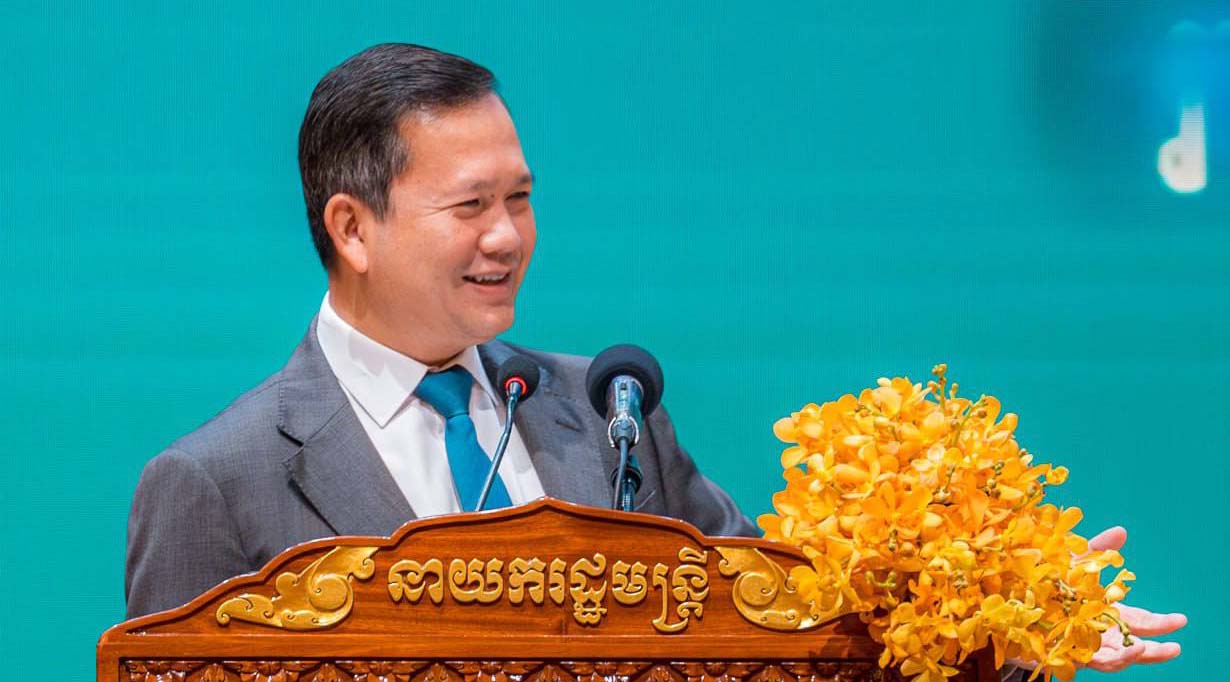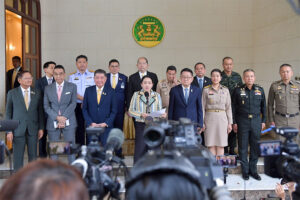Selected Comments Samdech Moha Bovor Thipadei Hun Manet, at the closing ceremony of the 43rd Annual Health Conference – “Health Achievements in 2023 and Work Directions for 2024”
 Selected Comments Samdech Moha Bovor Thipadei Hun Manet, at the closing ceremony of the 43rd Annual Health Conference – “Health Achievements in 2023 and Work Directions for 2024”
Selected Comments Samdech Moha Bovor Thipadei Hun Manet, at the closing ceremony of the 43rd Annual Health Conference – “Health Achievements in 2023 and Work Directions for 2024”
Selected Comments Samdech Moha Bovor Thipadei Hun Manet,
at the closing ceremony of the 43rd Annual Health Conference – “Health Achievements in 2023 and Work Directions for 2024”
[Unofficial Translations]
[1]
(1) Two lessons learnt from the Covid-19 pandemic crisis
The Covid-19 crisis had led us to the assessments of two aspects in health sector. The first is it showed us the practical capabilities of our doctors, officials, and health workers across the country […] the Royal Government, led by Samdech Techo, has led the highly effective combat against and control of Covid-19. We had more than 130,000 infected persons and more than 3,000 died. Should we have inadequate healthcare, I think, the number of death toll would not be at 3,000 […] and the second assessment confirms the the limited scope and some of the shortcomings that we faced, especially in relation to human resource development, human resource deployment, and the capacity level of our health units, especially at the sub-national level […]
[2]
(2) Expanding positive achievements while reducing negative points through bottom-up and top-down approaches
For the further development of the society, the Royal Government pays attention to two tasks in all fields – the first is to expand more positive achievements and the second is to reduce the negative points […] – to increase the positive achievements in health is to increase the capacity to provide quality health services to people everywhere […], for which we are focusing on two approaches – bottom-up approach and top-down approach […] firstly, we strengthen the provision of basic services/primary healthcare services from the bottom up, whereas the National Committee for Strengthening the Health Sector is preparing a plan to respond to some important tasks i.e. strengthen the selection of doctors to meet (the required number) and to keep them (in their in-demand professional responsibility) […], secondly, take into account the improvement of the quality of medicines and medical equipment […] ensuring the quality of drugs and reasonable prices so as to provide them to the local people, taking into account the main drugs lifelong illnesses such as high blood pressure and diabetes, especially for people in remote areas […] and thirdly, increase/strengthen the EMS or emergency medical services) […] where infrastructure and referral system are important […]
(3) Bottom-up and top-down approaches in the health sector
[…] The bottom-up approach focuses on strengthening the capacity to provide basic/primary healthcare services by strengthening the health unit from the grassroots to higher level […] which can be linked to health posts, health centers and onward to referral district hospitals […] we also need to go the other way, the top-down approach, which is to modernize and diversify the ability to treat advanced diseases, need high skills, expensive equipment, and training of doctors […] at the national level, then at the regional level, and at the provincial level […] these two approaches must go hand in hand. Strengthening the grassroots means we do not have to focus national level effort to tackle primary healthcare issues. (Our team of doctors at the grassroot level) are quite strong. (We should, in the top-down approach, focus) on modernization and diversification (of advanced treatment) […]
(4) Two major national hospitals and one regional hospital are achievements of top-bottom approach
The bottom-up approach is applicable because we can increase the number of doctors and recruit (staff) quickly. We can equip (a certain level) equipment at the health center. Should we provide the more sophisticated (equipment/tools), there would be a need for highly medical skill personnel […] that is (the capacity building according to) the top-bottom approach, which we do not need to deploy this level of capability to all provinces. As a first step, we strengthen the national level and (next,) we think at the regional level […] and in the late last year and early this year, there have been many great achievements related to the top-down approach. On May 23, 2023, we inaugurated the Techo Development Building at the Calmette Hospital under the presidency of Samdech Techo, on October 24, 2023, we threw the inauguration of the Techo Santepheap National Hospital, and on March 13 (2024), I inaugurated the Techo Sen Koh Thom Hospital, which serves the people as a regional hospital […]
(5) Developing regional hospitals in Kampong Cham and Siem Reap
On March 14, 2024, the Ministry of Economy and Finance signed a concessional loan agreement with JICA to develop two regional hospitals in Kampong Cham and Siem Reap […] in addition to our efforts to strengthen the national hospitals, we are also strengthening the sub-national level ones. We start from the regional level. Since we have 25 provincial capitals, we would not be able to do it all 25 provinces/municipalities at once. We start with a local regional hospital, and at a later stage, when we have more resource ability, we could increase the capacity of provincial hospitals […]
To decentralize or apply the top-down approach means to strengthen the transfer of national skills step-by-step to the provinces in order to close the gap (of healthcare provision capacity) between the provinces and the capital. Sooner, serious diseases such as heart surgery or cancer can be treated in the province or at the regional hospital without having to come to Phnom Penh. We will no longer struggle with this standard deviation […]
We have earmarked US$ 141 million for the construction and upgrade of these two hospitals in Siem Reap and Kampong Cham to become the regional hospitals. In about two to three years, once the hospitals are ready for service, there will be more decentralized treatment there. (Then, bringing critically ill patients) to Phnom Penh may decrease. People (will feel warmth) to have a hospital closer to them […]
(6) Human resources building in the health sector focuses on building capacity to serve the country
Strengthening the health sector from one term to another would ensure us capability in providing people with treatment and decentralizing responsibilities and capacity to the grassroots […], where building human resources remains the key. At the inauguration of Koh Thom Hospital, I said “people define everything …” and our main goal is to target people. If we talk about building human resources in the health sector, we need to focus on capacity building and organization to attract those human resources to serve the country […], and one of the biggest tasks of the human factor is to ensure building human resources to serve the state health sector, for which we are thinking about filling and keeping health workers in units they are placed […], whether they have been trained at the University of Health Sciences, at IU or at any schools, they have the ability to take the exam or be recruited through the recruitment system […]
(7) The Ministry of Health received rights and responsibilities regarding health education
There has been talks that there seemed to be some overlapping efforts between the Ministry of Education and Health regarding the authority to permit opening and/or closing of schools (with medical curriculum) […] I have asked (the Minister of Education, Youth and Sports,) HE Hang Chuon Naron, and (the Minister of Health,) HE Chheang Ra, to discuss what should be done to make it easier but not to lose responsibility. After they reached an agreement, I decided to give the right to the Ministry of Health to decide on opening and/or closing the health education institutions, to approve the national health curriculum, to manage the national entrance exam, to sign the diploma of the health sector, and to certify with accreditation and equivalence of health sector certificates/diplomas […], as this will facilitate, promote and coordinate in education (of medical skills) […]
(8) Age should not be conditional leading to loss of human resources
Another matter is to have people trained with quality. We have to recruit (really skilled and qualified personal) to come to the hospital […] we cannot react to (the needs) all at once, but we will do it step by step as to what to offer, where to do it first, and where to do next. That should not only meet (the need for quality human resources), but also ensure that (those human resources) are staying and working there and avoid the accumulation of staff in one place but lacking staff in another, and lacking permanently […] when Samdech Sok An was alive, I helped solve the case of DEA (Le Diplôme d’Études Approfondies – Diploma of Advanced Studies) and DESS (Le Diplôme d’Études Supérieures Spécialisées – Specialized Graduate Studies) that when they graduated, they were not employable by the state (for their ages) […] sometimes, small condition (of age limit) as such causes us to lose/drain human resources. We need to change and be flexible […]
(9) Contract officials – a new method to meet the needs of human resources
We need to think of another way with flexibility to find the right human resource (for the workplace), not just the health sector. In the future, it will be flexible for trained/educated persons to get in and out between the state and the private sector, or another place […] we are studying way to open for technical contract officials, for which we will calculate the salary rate, and the various benefits for them. Even though s/he has reached retirement age, as s/he has the skills, (we open this gate for them, it is better) than to ask for the principle of extending her/him once a year […] (doing so, it will) benefit the health unit, especially at the local level […] In health centers, it is not necessary that everyone is a doctor […] previously, people are worried about losing their tenure seniority […], a study has been undergoing now regarding the mobility of tenure, plus seniority. If s/he worked for the government for 10 years and went to work in the private sector (for some more years), we must figure out how to add her/his tenure durations altogether and what would be the formula for pension […]
(10) Assuring the health officials quality is assuring the health sector quality
I have been talking about this for 6 months now so that everyone knows about it and is ready […] in recent months, the Ministry of Public Works has been meeting with concerned ministries and professional institutions and finance to find a solution. We need to think not only from one angle, but also from all sectors, including civil servants, the military and the armed forces, in order for this work to be sustainable, consistent and effective […] where the quality assurance of health officials is the quality assurance of the health sector […]
Human resources are the big thing not only in the health sector, but in many areas. What is important is how we choose, ensure how he chosen person would be fit into our aim, ensure sustainability, fill in the gaps properly and be sustainable in filling (the number of human resources needed,) and other incentive arrangements […]
(Here is) something that need to be taken care of to reduce our shortcomings […] by all health units, both public and private, to strengthen the responsibility, especially in the regulation of health services, as the Ministry of Health has strengthened the standard and operating conditions, as well as compliance checks at hospitals, pharmacies and sub-pharmacies in some provinces and capitals, as well as taken measures to enforce closure or revocation of licenses in some units. Controlling the quality of drugs, product quality is an important task to be carried out with flexibility, gentleness but firmness […]
[3]
(11) Health budget allocation has been decentralized to the provinces
Some provinces may still confuse that all budgets are still at the central level. (Please be informed that) this budget (allocated for local healthcare) has been transferred to the provinces for repair/operation works, except when it comes to new construction or additional regional level hospital […] some provinces seem to be still unclear […] and resort to asking for fund from the Ministry of Health to fix the health center buildings. In fact, the budget has already been decentralized, except when there is a demand for building a new health center, for which they can asked for […]./.






